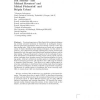279 search results - page 21 / 56 » Learning and reasoning about interruption |
LPAR
2004
Springer
14 years 2 months ago
2004
Springer
DPLL and DPLL Modulo Theories Robert Nieuwenhuis , Albert Oliveras , and Cesare Tinelli We introduce Abstract DPLL, a general and simple abstract rule-based formulation of the Davi...
SPEECH
2010
13 years 3 months ago
2010
Despite years of speech recognition research, little is known about which words tend to be misrecognized and why. Previous work has shown that errors increase for infrequent words...
ASPLOS
2011
ACM
13 years 6 days ago
2011
ACM
In practice, it is quite difficult to write correct multithreaded programs due to the potential for unintended and nondeterministic interference between parallel threads. A funda...
IJIIDS
2008
13 years 8 months ago
2008
: Growing importance of distributed data mining techniques has recently attracted attention of researchers in multiagent domain. Several agent-based application have been already c...
UM
2007
Springer
14 years 2 months ago
2007
Springer
Accurately recognizing users’ affective states could contribute to more productive and enjoyable interactions, particularly for task-oriented learning environments. In addition t...

